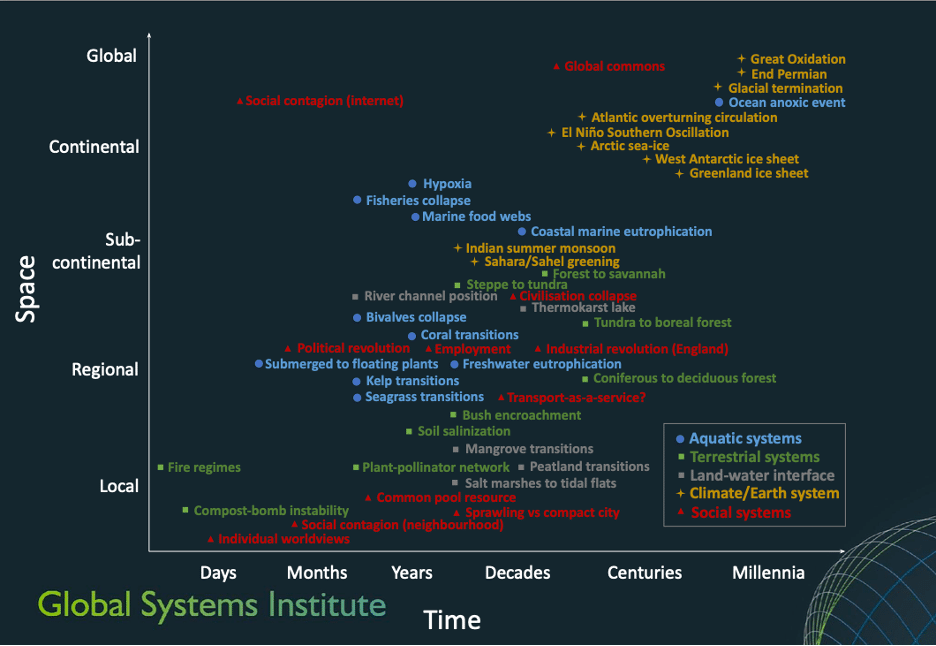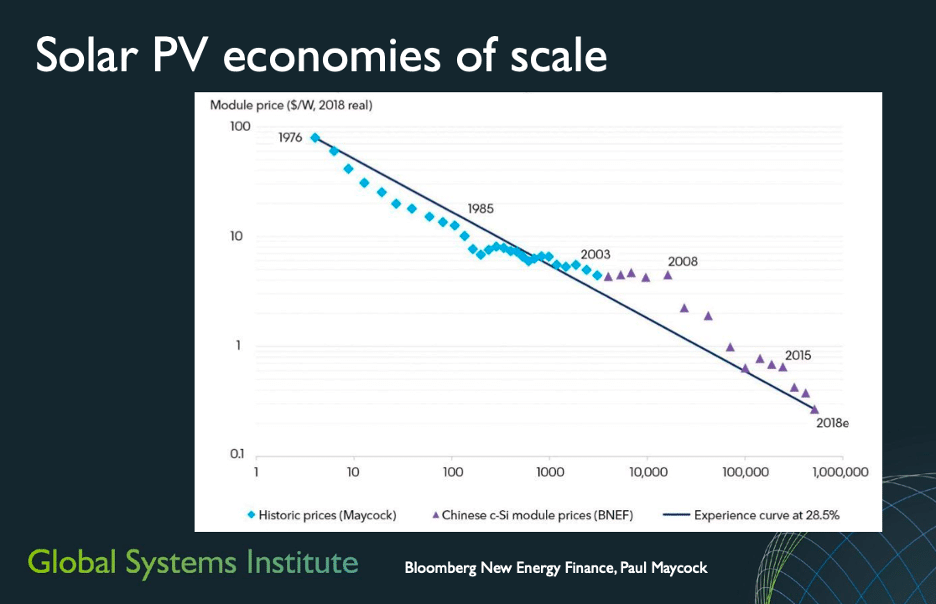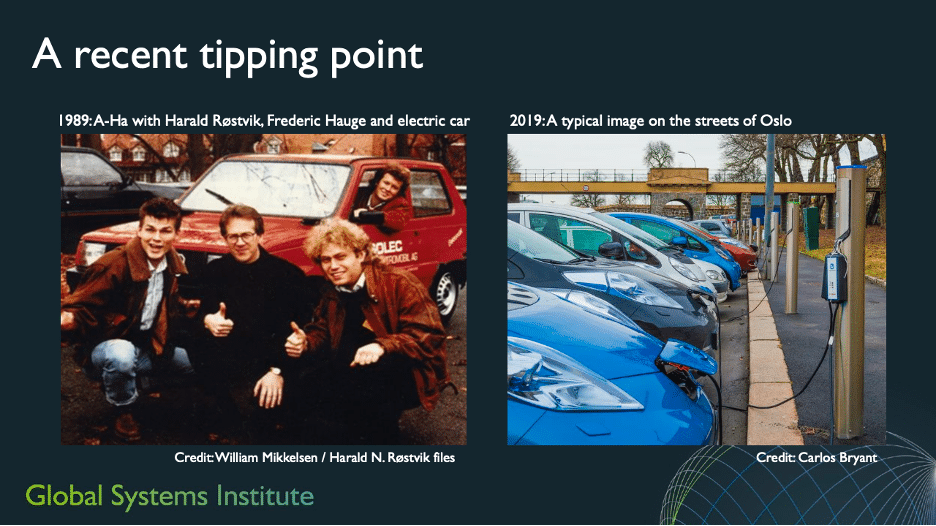Climate as a Complex System
On January 4, 2023, at the Building Efficiency for a Sustainable Tomorrow (BEST) Center Annual Institute, the University of Exeter’s Professor Tim Lenton gave a webinar on climate tipping points and the crucial role of “positive social tipping points” to avoid climate catastrophe. Lenton first set the stage by explaining that the climate is a complex system, and that we’re in a climate and ecological emergency where “in just the last decade alone, we’ve seen an increasing body of evidence demonstrating that certain parts of the climate system are destabilizing at an accelerating rate—and it’s critical to act now if we want to limit those risks.” Lenton explained that the principle of tipping points is the idea that complex systems, such as the climate system, sometimes reach a point where they’re incredibly sensitive to even a small perturbation—and that a little nudge can lead to a large change in outcome. He presented examples demonstrating that we are in a state of climate emergency, and that some damaging climate tipping points may already have been passed—and we are quickly approaching other detrimental tipping points.
Cautioning that he would first “begin with the bad news,” Lenton shared examples of tipping points from aquatic systems, including fisheries collapse; terrestrial systems, including soil salinization, conversion of forests, and plant-pollinator network destruction; and climate systems, including glacial termination and Arctic Sea ice melting, among others. Lenton continued that limiting global warming to “well below 2 degrees Celsius now necessitates leveraging positive tipping points to achieve the level of transformational change necessary.” Lenton’s research focuses on identifying these key areas for positive tipping points, which include regeneration of degraded ecosystems, electric vehicles and clean transport, and solar and wind energy, among others.

For example, the increasing number of electric vehicles (EVs) being made has caused EVs to become much more affordable. At the same time, the UK has nearly eliminated coal burning from its electricity production—which has resulted in a change from roughly 40 percent of electricity generation from coal power in 2012 to nearly zero in 2023. Tipping the regeneration of degraded tropical forests also has huge potential to store or remove carbon from the atmosphere and contribute significantly to solving the climate problem. Similarly, solar photovoltaic (PV) energy has benefited from economies of scale, as increasing adoption has led to drastically reduced prices. Read more about Professor Lenton’s research
Increasing Returns, Increasing Climate Benefits
Lenton described three main advantages of increasing returns:
- “The more something is made, the better it can be made (learning-by-doing)
- The more something is made, the more cheaply it can be made (economies of scale)
- The more something is used, the more technologies emerge that make it more useful (technological reinforcement)”
Lenton added that “we often feel disempowered as individuals when faced with something as enormous as the scale of the climate crisis.” At the same time, the world has been fundamentally transformed in the history of our planet—so we should be able to come together and identify and trigger positive tipping points to create the kind of transformative change necessary to tackle the climate crisis.

Tipping Towards Positive Change
To this end, deliberate actions and reinforcing feedback within our society, technology, and economy, are starting to “tip positive change.” Lenton provided a few examples of recent positive tipping points, such as how Norwegian pop band A-ha used one of the first EVs to launch a campaign of civil disobedience, which ultimately led to Norway’s electric vehicle revolution. Similarly, Greta Thunberg staged a school strike for climate outside the Swedish parliament, which inspired the global Youth Climate Strike and Fridays for Future movements.

Lenton added that the “only way we’ll achieve the necessary reduction in global carbon dioxide emissions is if we find positive tipping points, by leveraging the power of ‘social tipping interventions.’” These social tipping interventions can include incentivizing decentralized, renewable energy production; creating carbon-neutral cities and transportation; removing fossil-fuel subsidies and divesting fossil fuel-linked assets; enhancing climate change awareness and education; disclosing emissions information, among others. Read more about social tipping dynamics here
Becoming Part of the Solution
Lenton concluded the talk on a hopeful note and with a key call to action: Examples of deliberate action that lead to demonstrated positive change—from increasing the adoption of biking, which leads to the expansion of cycling lanes, to rapidly adopting electric vehicles, reusable shopping bags and straws, and cutlery, among others—“should give us all a sense of agency in the face of a daunting problem [as] we can all be part of triggering positive tipping points.”
Leveraging the Neighbor Effect
In a similar vein, the Oakland EcoBlock project seeks to leverage the neighbor or peer effect—a social tipping point. The neighbor effect is a critical force to accelerate climate change resilience: The EcoBlock neighborhood community has worked together to teach each other complicated concepts related to energy resilience (including stormwater mitigation; microgrids; heat pumps; induction cooktops) and strengthened community connections within the neighborhood. The community recently held a laundry-to-landscape workshop, where neighbors worked together to help install simple greywater systems that would enable recycling of water from household washing machines to water neighborhood trees and plants.
The Oakland EcoBlock is an example of the power of neighbors engaging and recruiting neighbors, serving as the positive social tipping point necessary to accelerate community climate and energy resilience—with the goal of scaling up from local resilience to global resilience, block by block.
Learn more about greywater systems

